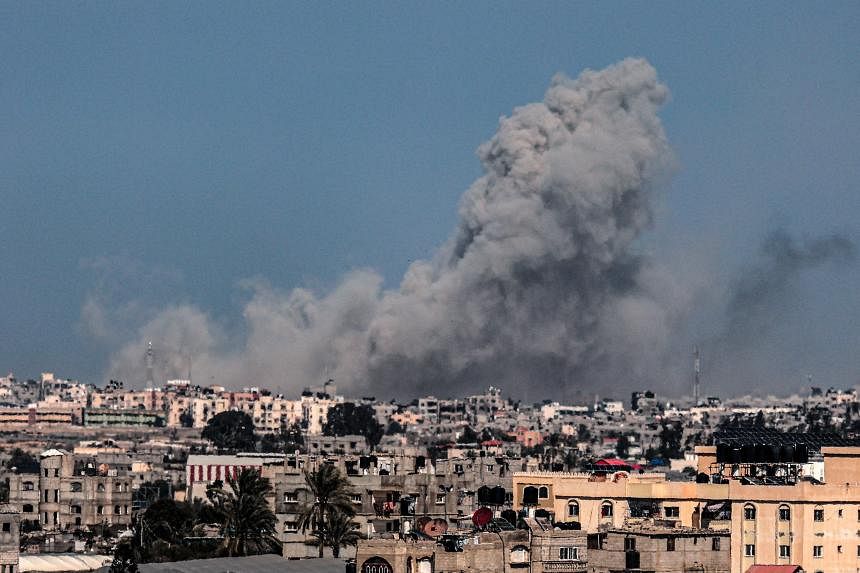SINGAPORE - The Ministry of Home Affairs (MHA) said on Feb 22 that the authorities have advised fashion influencers Camira Asrori and Dahlia Mohd over social media posts relating to the Israel-Hamas conflict.
MHA said Ms Camira, 29, was advised against encouraging Singaporeans to protest overseas, because it had seen that such activities can lead to public disorder and violence, and protesters risk breaking the laws of the foreign country and putting themselves in harm’s way.
The Straits Times asks criminal lawyers whether Singaporeans risked breaking laws here if they joined protests abroad.
Q: Is attending a protest overseas illegal?
A: This depends on the nature of the protest, lawyers said.
MHA did not reply when asked about the legality of Singaporeans protesting overseas.
Criminal lawyer Cory Wong from Invictus Law said: “It really depends on the nature, extent, type of the protest, such as whether it was peaceful or violent, or whether comments were further made or posted on social media at the same time.”
He added that if the protest was a violent one, it would likely be subject to violence-related laws in the foreign country.
Likewise, criminal lawyer Ramesh Tiwary noted that the Public Order Act, which typically covers protests in Singapore, does not have extraterritorial reach.
“It cannot be an offence within Singapore unless Singapore’s Parliament makes it an offence, like the consumption of drugs overseas,” said Mr Tiwary, drawing reference to the Misuse of Drugs Act which criminalises the consumption of drugs overseas by Singaporeans.
Lawyer Gloria James-Civetta said attending a protest abroad is unlikely to constitute an offence unless the protest ignites security or public disorder concerns in Singapore.
Q: When can attending an overseas protest become illegal in Singapore?
A: Singapore’s Penal Code covers offences such as unlawful assembly, public mischief and wounding racial feelings.
Section 3 of the Penal Code states that any person liable by law to be tried for an offence committed beyond the limits of Singapore shall be dealt with according to the Code for any act committed beyond Singapore, in the same manner as if such an act had been committed within Singapore.
However, in October 2023, Chief Justice Sundaresh Menon delivered a judgment in which he stated that “no person who has committed in the territory of a foreign state an act which is criminalised in Singapore, shall be liable to be tried in Singapore for having committed an offence under the Penal Code by virtue of Section 3, unless there is some other specific legislative provision having this effect”.
Mr Wong pointed out that the Maintenance of Religious Harmony Act has extraterritorial reach under Section 17C, where some offences committed by a person outside Singapore may be dealt with as if they had been committed in Singapore.
These offences include urging other people to use force or violence against a group in Singapore on the grounds of religious belief; inciting feelings of enmity, hatred, ill-will or hostility against – or contempt for or ridicule of – a religious group in Singapore; and insulting the religion or activity of another person in Singapore.
Ms James-Civetta agreed, adding that posting about attending protests overseas could potentially fall within the ambit of the Public Order Act if such posts are deemed to be inciting or encouraging others to engage in activities that might jeopardise public order or security in Singapore.
“The mere posting about attending a peaceful protest overseas is unlikely to be deemed illegal. However, posts inciting violence, hatred, or disaffection towards the Government or other racial groups could raise concerns,” she said.
Q: Can I refuse questioning until the authorities issue an interview letter?
A: In her video, Ms Camira advised viewers on how to deal with the authorities if they are questioned, saying one can refuse questioning, insisting first on an interview letter from the police.
Lawyers said asking for such a letter before attending the interview could be seen as asking for proper procedures to be followed, instead of refusing to cooperate.
Mr Tiwary said: “The law requires the police to send a notice, so to ask for one should not be seen as not cooperating.”
The Criminal Procedure Code (CPC) states that in conducting an investigation, a police officer may issue a written order requiring anyone in Singapore, who appears to be acquainted with any of the facts and circumstances of the case, to present themselves before the police officer, and that person must attend as required.
However, the police said in the case involving Mr Lee Hsien Yang and Mrs Lee Suet Fern in March 2023 that a written order requesting attendance before the police is not generally issued in the first instance, unless the person is assessed as likely to be uncooperative, or if there is some other reason.
This is consistent with how cases of a similar nature are dealt with, said the police then.
Ms James-Civetta noted that there is no “right to remain silent” in Singapore. “The police have special powers to compel persons to attend interviews, whether as a witness or as a suspect of a crime.”
Q: Can the authorities ask for my phone password without a warrant?
A: Ms James-Civetta said that, while one is generally not obligated to provide passwords to the police, this depends on the circumstances in which the phone password is being requested.
Under the CPC, a police officer investigating an arrestable offence may, without a search warrant, search anything if the officer considers it necessary for investigations and if the officer has reason to believe that the person is unlikely to produce the item or to give access to it.
The officer may also do so if he has reason to believe that the thing to be searched is likely to be removed.
Mr Tiwary said: “If (the phone) was used in the commission of a crime and you refuse to provide it, that can be seen as not cooperating with the police. But on the other hand, you have a right to refuse to answer a question that can result in exposing you to a criminal charge. However, adverse inference can be drawn if one chooses to refuse.”



